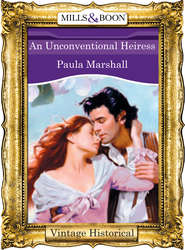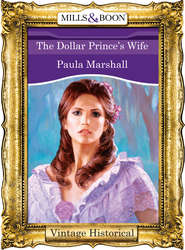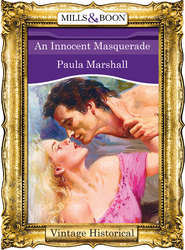По всем вопросам обращайтесь на: info@litportal.ru
(©) 2003-2024.
✖
The Missing Marchioness
Настройки чтения
Размер шрифта
Высота строк
Поля
On the other hand there was little pleasure in an easy conquest. His campaign to win her into his bed might be long, but it would be entertaining if this afternoon was anything to go by, and the prize he would gain at its end would be well worth winning.
To the victor the spoils—and now to return to his humdrum life again, to visit his old aunt, his mother’s sister, who had arrived in London for a short stay and had written to him to say that she particularly wished to see him.
What puzzled him was what she could possibly have to say to him. He remembered meeting her once, years before, and even then, when he was little more than a child, noticing that, unlike his mother, she was no beauty. He had heard that she was married to a Norfolk squire and had had a large family: his cousins, whom, for one reason or another, he had never met.
He discovered that she was still not a beauty, but, like his stepmother, had a face full of character. Her pleasure at meeting him was great and unaffected.
‘Oh, how much you resemble your father!’ she exclaimed when all the proprieties had been gone through, and they were seated together and he had accepted a glass of Madeira and some ratafia biscuits.
‘I always admired him, you know, and was sad when he offered for Danielle, and not me. On the other hand I was later relieved that he had not done so, for I should not have liked to go to India, so hot and nasty, and I could not have had a better husband than my dear Robert, God bless him.’
Robert Hallowes had died some years earlier and she had been living at the Dower House on the Hallowes estate near King’s Lynn. She spoke briefly of her life there, and asked Marcus about his in Northumberland.
‘I suppose you knew of, if you did not mix with, that dreadful man, Sywell. He was someone to avoid, you know. His reputation was bad from the first moment he burst into society, and believe me, burst was the right word! Your father grew to dislike him intensely and there were some rumours about him and Sywell both being interested in another young woman before he met Danielle and myself in our first season. Fortunately I was not the sort of youthful moneyed beauty Sywell was always pursuing.’
She gave a jolly laugh after saying this, and Marcus could scarcely believe that she was his mother’s sister, so unlike was she to her. She took a sip from her glass of Madeira before saying in a more serious voice, ‘I think that it is time that I spoke to you about the reason for my asking you to visit me. I have often thought that you ought to be told the truth about your parents’ marriage and when I heard from a friend that there had always been some constraint between you and your father, and that they thought it likely that it arose because of their failed marriage, I was more than ever convinced that I had a duty to do so—so here we are.’
She stopped, and now she was so solemn that she was like a different person. ‘You must understand that Danielle was a great beauty and it was our parents’ hope that she would make a grand marriage. They put a great deal of pressure on her to marry your father, who was known to be the likely Yardley heir, and was then a young man of great promise.
‘The trouble was that she had already fallen in love with the heir to the small estate next to ours, and was most reluctant to give him up—except that I think that the notion of becoming Lady Yardley one day attracted her. I regret to say it, but she was always flighty, changed her mind every other day and felt it her duty to attract every young man she met. My parents were eager for her to be married. They thought that it would settle her.
‘Alas, once she was married, she became more flighty than ever. She regretted her lost love and made up for it by behaving as wildly as she could without putting herself in danger of society ostracising her. She was very like Lady Caroline Lamb is today: defying all the conventions. The worst thing of all, though, is that her behaviour made your father doubt whether you were truly his son. It was only when, as you reached manhood, your likeness to him became so strong that he could no longer doubt that he was truly your father.’
Marcus gave a great start on hearing this. It explained so much of his father’s behaviour to him. He said, and his voice sounded strange to him when he spoke, ‘Had he any real reason to believe that she was telling the truth?’
His aunt smiled sadly. ‘A little, perhaps, but the pity of it was that Danielle, when they quarrelled, which was often, frequently taunted him with the possibility that he was not your father. It grieves me to say this, but the main reason for the failure of their marriage lay at Danielle’s door rather than his. He was, in fact, extremely patient with her. Unfortunately her behaviour resulted in the coolness which lies between you and your father. She was unhappy, made him unhappy and destroyed the affection which should lie between father and son. In all fairness to him—and to you—I thought that you ought to know the truth.
‘I understand that his second marriage is a happy one, and that you are fond of your stepmother and she of you—but my poor sister had much to answer for before she died. She had already broken off all ties with our parents and with me—to our great grief.’
Marcus sighed. He thought bitterly of the many years during which he and his father had been estranged. Of late they had come together a little, and now it seemed, if his aunt could be believed—and he thought that she could—that he might be able to heal the breach which misunderstanding had created.
His aunt could see his distress. She said, her voice anxious, ‘I hope that I was not wrong to tell you this, but I owed you the truth.’
Marcus leaned forward and kissed her impulsively on the cheek. ‘You were not wrong, but right, and I wish that I had known of this before. It must have hurt you to speak so plainly of a sister whom you must once have loved.’
‘Yes, you are like your father,’ said his aunt. ‘Brave and strong-minded. He never once complained to anyone about Danielle’s folly, but bore it like a man. He has his reward in Marissa—and, I am sure in you. Now let us talk of other, happier, things. I hope that you will all come to visit me. I should dearly like to see your half-sister and brothers.’
‘So you shall,’ said Marcus energetically, ‘and you shall come to Sophia’s wedding, too. After all, you are my aunt and now I owe you a debt of gratitude for telling me the truth.’
All the way home his thoughts ran round and round his head like animals exercising themselves in a cage. As a child he had always thought that there must be something wrong with him that his father had shown him so little affection. Later, his father’s manner had changed a little, and the story his aunt had told him explained why it had. He must try to forget his own resentment and make up for the lost years which lay between them.
Had she seen the last of him? Louise rather doubted it. There was a determination about Marcus Angmering which she found admirable, but which frightened her a little. He had spoken the truth when he had said that there were few places where they might meet, but she had no doubt that one way or another he would contrive to meet her.
She owned a little house in Chelsea to which she retired at the weekend. During the week she lived over the workrooms. She drove her girls hard, but only on five days a week, something almost unknown in the trade, but she had found that they worked better in those five days than those did whose employers demanded longer hours and less kind conditions. She remembered her own harsh youth too well to subject others to it, and it amused her to discover the monetary benefits of a more liberal regime.
Two days after Marcus had visited her she became aware—or thought that she did—that she was being watched. Living with Sywell had given her a sixth sense. Twice she saw the same stranger on the corner when she went out for a stroll in the late afternoon. And could it be simple coincidence that the same stranger appeared on the pavement in front of her Chelsea hide-away, whose address no one, not even her fore-woman, knew? They all thought that she lived permanently above the salon.
Had Marcus Angmering had the gall to pay a spy to follow her? She would not put it past him. What could be wrong with her that all the men in her life turned out to be domineering creatures determined to have their own way? Wasn’t it enough for her to have had Sywell to endure without another such creature turning up to chase after her?
Or was she seeing enemies around every street corner simply because her past life had made her wary of everyone and everything? She liked to think that, but she could not be sure.
Louise was not mistaken. Marcus had driven straight to the address of the ex-Runner whom he knew his friend Nick Cameron had used to discover what he could about Athene Filmer.
‘It’s a simple task,’ he told the man, whose shrewd face and knowing eyes quickly summed up Marcus as the hard sort of gent who knew what was what—and what he wanted. ‘Just find out whether she lives above the shop—or whether she has another home away from it, that’s all. And whom she mixes with—if she mixes with anyone, that is,’ Marcus added, remembering that Louise had told him that she didn’t move in any circles.
Jackson knew better than to ask m’lord why he wanted to know. He nodded, and promised absolute discretion. ‘You may be sure, m’lord, that the job will be done in such a way that she won’t know that it’s being done at all.’
‘Excellent,’ said Marcus.
The Earl saw Jackson on his way out. He said, his brows raised a little, ‘You have had occasion to employ an ex-Runner, Marcus? They are not always either honest or reliable, but I believe that that man is.’
He did not tell Marcus that Jackson had visited him on behalf of the Home Office over the matter of Sywell’s murder, nor did he ask Marcus why he had employed him.
Marcus said quietly, ‘My friend Cameron recommended him; he found him honest. I need a confidential matter settled before I leave London.’
The Earl did not ask what the confidential matter was, but began to move away. Marcus said, ‘sir, there is something which I wish to say to you and now seems as good a time as any—if you have a moment for me, that is.’
His father turned towards him and said a little heavily, ‘I always have time for you these days, Angmering. It is my deepest regret that once I had not. I promise to listen to you and give you my full attention.’
Marcus blinked; it was almost as though his father knew what he was about to say. They moved back into the study. His father did not sit behind his desk, but walked across to sit in a chair by the window. He motioned Marcus to the one opposite.
Now that the moment had come, Marcus found that he was lost for words. Once, when he was younger and rasher, he might have attacked his father with the knowledge of what his aunt had told him, reproached him a little for mistreating him because of what he had thought his mother had done. Now he could only feel pity for a man who had been as much a victim as himself.
‘Sir,’ he began, ‘I met my aunt, my mother’s sister, yesterday at her request, not mine. She told me the true story of your marriage, and explained to me why, when I was a child, there was always a strong reserve in your manner to me.’
It was the kindest way he could think of to describe the coldness and lack of interest which his father had shown in him during his childhood. Since the Earl made no immediate answer to him, he ploughed on, finding in himself a diplomacy which he had not known he possessed.
‘She also explained why, when I grew up, your manner to me softened a little, and when I look at the portrait of you painted when you were my age now and I look at myself, the strong resemblance between us convinces me, as it must have convinced you, that I am truly your son.’
The expression of pain on his father’s face was momentary, but it was there. Marcus felt it incumbent on him to continue. ‘My aunt also told me that the fault in your marriage did not lie with you, and that you had shown great patience with my mother’s behaviour until the day she passed out of our lives.’
He was silent—and so was his father.
Finally the Earl spoke. ‘If I find it difficult for me to answer you, it is because I feel, and have long since felt, shame that I treated an innocent child as harshly as I did. Even if your mother had spoken the truth about your fatherhood I should not have visited her sin upon the head of someone as defenceless as you were then. The constraint which still exists between us comes on my side from my stupidity in allowing a lie to dominate my—and your—life for so long.
‘I ask your pardon, and trust that from now on we might become friends. We cannot call back the past and change it, but we can refuse to allow it to poison our lives on the future. My own relief is that my behaviour to you did not harm you—you have turned into the kind of son a father can be proud of. I therefore ask you to forgive me, if you can.’
Marcus leaned forward and said in his straightforward way, ‘No forgiveness is needed, sir. Understanding rather, for what my aunt told me made me feel pity for you—and lessened the pity I felt for myself.’
His father rose and put out his hand, saying, ‘Let that serve as an epitaph for the dead past, Angmering, and we will shake on it, if you would. It is fitting that before your sister marries we should come together thus and be able to join in the celebrations as a true father and son at last.’
Marcus rose, too. They stood face to face, the stern father, and the son whose likeness to that father was written on his face, in his voice and in his manner.
‘Indeed, sir—and that will be the end of that, I trust.’
His father nodded and they remained silent for a moment, the loud ticking of the clock being the only sound in the room: a fit commentary on the passing of life and time.
Marcus did not have long to wait for his hiring of Jackson to bear fruit; after all—as the man had told him—it was a simple enough task compared with most he was given.











